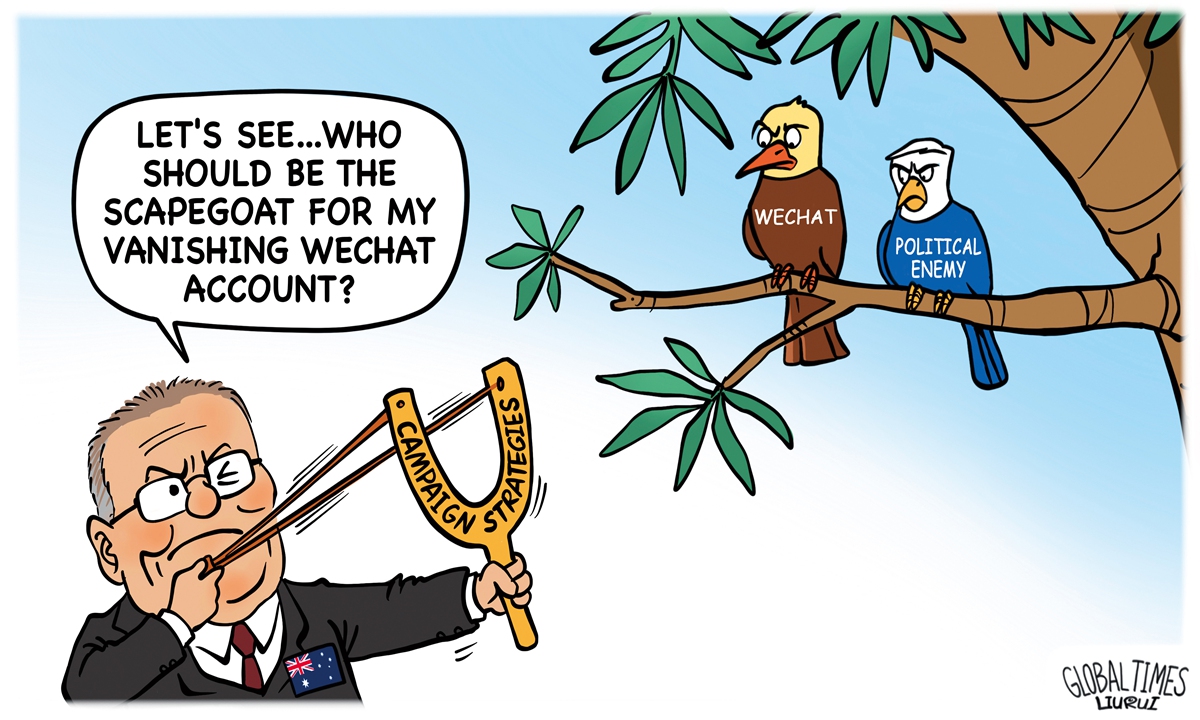
Australian Prime Minister Scott Morrison, WeChat. Illustration: Liu Rui/GT
As Australia's 2022 federal election approaches, news reports about China's so-called interference in Australian politics have emerged again. This time, their target is a social media platform widely used in China and around the world - WeChat.
Australian media recently made allegations that Australian Prime Minister Scott Morrison's personal WeChat account was "blocked" by China and turned into a so-called "pro-Beijing mouthpiece" under the name of "Australian Chinese new life."
Tencent told the Global Times on Monday that the incident appears to be a dispute over account ownership. But before the facts are clear - or perhaps they do not care about the facts at all - some Australian politicians have hurriedly targeted the Chinese government, accusing China of trying to interfere in the upcoming Australian federal election.
WeChat is the most widely used social media platform in China, and it also has many users overseas. It is a software developed and owned by private Chinese technology giant Tencent. Before the 2019 Australian federal election, Morrison opened his WeChat account, hoping to strengthen communications with ethnic Chinese voters in Australia and win more votes for the Liberal Party. For Morrison, WeChat has always been meant to be a campaign tool.
It is worth noting that Morrison's WeChat account issue this time was initially reported by the Daily Telegraph. This Sydney-based tabloid is owned by Rupert Murdoch, whose media outlets' coverage of China is now increasingly negative.
Morrison's WeChat account was in question, while Australian Labor Party leader Anthony Albanese's WeChat account is still available. Unsurprisingly, Liberal politicians immediately took the chance to make a fuss about it, groundlessly accusing China of meddling in Australia's general election.
For example, Liberal Senator James Paterson, who chairs the Australian parliament's intelligence and security committee, said that "We cannot allow a foreign authoritarian government to interfere in our democracy and set the terms of public debate in Australia." Without any direct evidence, he said Morrison's account issue is an effort by the Communist Party of China to "silence our free speech."
Paterson has always been the flag bearer of the "China threat theory" and "China infiltration theory" in Australia. Therefore, it is not surprising that he made the above-mentioned allegations. He has never given up speculating, attacking and criticizing China with the most malicious ideas. Although he had no proof, he started to characterize the WeChat account incident, used it to criticize China and tried his best to promote his conspiracy theory. This is also the consistent practice of right-wing politicians in Australia - they never care about right or wrong when it comes to China-related issues, but only political posturing.
Actually, this WeChat account incident is not an isolated one, but one of Australian media and politicians' tricks to spread the so-called "China infiltration" theory. As early as June 2017, there had constantly been media outlets and politicians that decried China's political "intervention" in Australia and spread "China infiltration theory." Later, the Australian government revised the national security legislation on this ground.
Due to the sensitivity of political issues, the emergence and spread of "China infiltration theory" has led to serious consequences. It has not only worsened China-Australia relations but also created an atmosphere similar to McCarthyism in Australia - anything related to China may be used as a tool to attack political opponents.
Overseas Chinese and Chinese students in Australia have also been severely stigmatized. The impact of "China infiltration theory" is also reflected in the WeChat account incident this time. For example, Liberal MP Gladys Liu made an announcement on Monday that she will no longer use her official or personal WeChat accounts to communicate "until the platform explains itself."
Manipulating China-related issues to attack opponents and seek political interests is all too common in Australian politics. As this year's federal election draws nearer, many Australian media outlets and politicians have turned to this old trick again. Both Chinese and Australian people should be vigilant about this. The politicians see nothing but personal interests and group interests. But manipulating China-related issues will further damage China-Australia relations, and will hurt Australia's own national interests.
The author is an assistant research fellow at the China Institute of International Studies. opinion@globaltimes.com.cn




